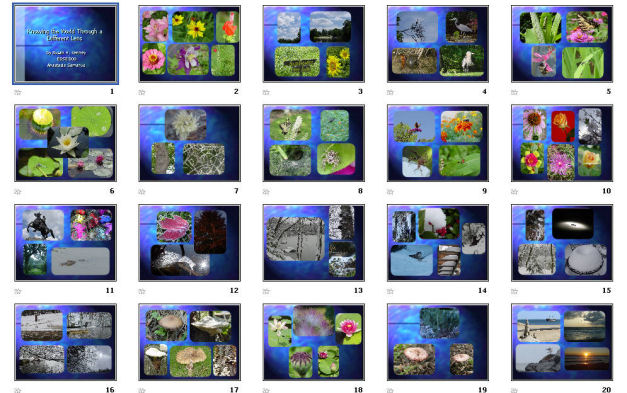EDUC 800
Ways of Knowing
George Mason University
Fall 2006

EDUC 800
|
 |
|---|
I have spent the past half-century soaking up knowledge like a deep sea sponge, eagerly siphoning every morsel that came within reach. Items of knowledge were tagged, sorted, referenced, and catalogued. The treasure was built up and shared but rarely questioned. Others were trusted as experts while my thoughts were gently “shushed” into oblivion never daring to be considered worthy to be uttered. It took several classes for the churning ocean currents of new ideas to tear me from my comfortable, soft, sandy bed. They swirled about mercilessly clawing at ingrained spectator roots.
The greatest impact was delivered during class discussions, interactions with fellow doctoral students, and writings of the journal entries. As the cloudy turmoil began to settle, my PhD journey was launched. A realization emerged helping me to understand that the gathering of knowledge is less important than questioning it, interacting with it, testing it, as well as verifying truths and forming new hypotheses. The constant questioning, comparing, and analyzing were an appropriate initiation into a "community of scholars."
Although
I had great difficulty understanding many of the readings, I was intrigued with
the descriptions of the effective collaborative teams by John-Steiner. The experience was made even more powerful
when combined with the modeling of the teams of professors from EDUC 805 and with
our own film collaboration experience where we were encouraged to experience
through a different perspective.
To understand different ways of knowing, we watched a film and responded with a letter about the way of knowing demonstrated in the film. It was fascinating to view the film, reflect with a partner, and write a letter to someone about the experience. We also set up an activity to invite other classmates into a moment of this way of knowing. After viewing a strategic clip of the film, we set paper on the floor and put markers on top. The class was given 5 minutes to communicate something using only their left foot. It was a poignant simulation of the struggle of people with disabilities!
A favorite exercise was presenting “My Way of Knowing.” Because I am a visual learner and photography is a personal passion, I created a PowerPoint using my photographs assembled to display beauty, hardship, insignificance, seasons and life’s lessons in nature. See some of the slides at the end of this reflection.
The
most difficult assignment was the Ways of Knowing paper. My temptation was to investigate the Learning
Disabled “way of knowing”. Having lived
with my own severe spelling and handwriting difficulties, and those of my
brother, husband, and two sons gave me an intimate knowledge of learning
disabilities. I also have a Masters
degree in Special Education and have taught students with disabilities for many
years. To investigate this high
incidence disability in which I have been immersed was appealing. The search would be easy and findings would
be self evident. Yet, the invitation to
a new depth of exploration and understanding overcame a desire to hit the
easier target.
Thoughts
of a young student with strange repetitive behaviors, echolalia, and life
within a world of his own came to mind.
Would investigating the world of autism help me understand and work with
the student more effectively?
Plunging
into autobiographies written by people with autism gave me a much better sense
of the difficulties and gifts they experienced.
I went to workshops, classes, read teaching books, interviewed teachers,
parents, and students with autism. A
closed door to interaction with my own cousin was unlocked as we corresponded
about his experiences with a daughter with autism. Fear, bred by ignorance, slowly melted.
Revelation of the similarities and challenges awakened a passion to know
more! The
most incredible idea uncovered
was that although most people consider autism as a disorder and
deviance from
normal, all three autobiographers, wrote about the gifts and benefits
of autism
and expressed dismay at the thought of being “cured.”
To illustrate all that I learned, I also created
a Power Point- "Autistic Ways of knowing."
A
feeling of great accomplishment merged with the knowledge that I had but
explored the tip of the autistic way of knowing! This slightly better understanding of autism
has revolutionized my perspective! I
know this will help me become more effective as I seek to help students with
Special Needs become more integrated into community life.
